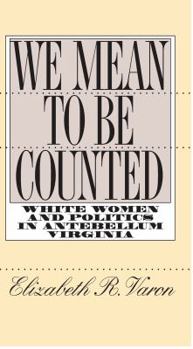We Mean to Be Counted: White Women and Politics in Antebellum Virginia
Select Format
Select Condition 
Book Overview
Over the past two decades, historians have successfully disputed
the notion that American women remained wholly outside the realm of politics until the early twentieth century. Still, a consensus has prevailed that, unlike their Northern counterparts, women of the antebellum South were largely excluded from public life. With this book, Elizabeth Varon effectively challenges such historical assumptions. Using a wide array of sources, she demonstrates that throughout the antebellum period, white Southern women of the slaveholding class were important actors in the public drama of politics.
the notion that American women remained wholly outside the realm of politics until the early twentieth century. Still, a consensus has prevailed that, unlike their Northern counterparts, women of the antebellum South were largely excluded from public life. With this book, Elizabeth Varon effectively challenges such historical assumptions. Using a wide array of sources, she demonstrates that throughout the antebellum period, white Southern women of the slaveholding class were important actors in the public drama of politics.
Through their voluntary associations, legislative petitions,
presence at political meetings and rallies, and published
appeals, Virginia's elite white women lent their support to such
controversial reform enterprises as the temperance movement and the American Colonization Society, to the electoral campaigns of the Whig and Democratic Parties, to the literary defense of
slavery, and to the causes of Unionism and secession. Against the backdrop of increasing sectional tension, Varon argues, these
women struggled to fulfill a paradoxical mandate: to act both as
partisans who boldly expressed their political views and as
mediators who infused public life with the "feminine" virtues of
compassion and harmony.
Format:Paperback
Language:English
ISBN:0807846961
ISBN13:9780807846964
Release Date:March 1998
Publisher:University of North Carolina Press
Length:248 Pages
Weight:1.05 lbs.
Dimensions:0.6" x 5.4" x 9.1"
Customer Reviews
1 rating
A new look at antebellum Southern women
Published by Thriftbooks.com User , 15 years ago
The historical consensus is that white women in the antebellum period were excluded from political participation. Varon argues that elite middle class women were active in political participation, but they did not attempt to occupy the public sphere of men. Instead, women organized benevolent societies, worked as mediators, petitioned, volunteered, wrote, and attended public meetings. This book is not to show us women were always a cohesive force with a long term goal of suffrage or equality, indeed not because Southern women were generally quite content with the social order. We Mean to be Counted merely rejects the premise that women were entirely excluded from politics by showing that, no, there were women involved. Whether 10 or 10,000, women still found a place for themselves and their talents. According to Varon, women were believed by their nature to be disinterested, moral forces of restraint and education for men and children. In occupying a public sphere through political activity, women were fulfilling the duties of their private sphere of motherhood and wifedom. Organizations such as girl schools and colonization societies were seen as perfect for the nature of a woman, and any political knowledge passed on to her through participation in parties such as the Whig party (Whig Womanhood) was only so that she could use her intelligence to form a patriotic family. Initially also, Southern women were to act as sectional mediators between the North and South. As time went on, though, and slavery debates heated up, the concept of "Confederate motherhood," with its fervent belief in preserving the south as it was. Varon has written a well rounded perspective on elite white antebellum women and their roles in politics, which she supports convincingly with her source usage. By refuting a popular and generalized claim that women were not politically active in this time, she contributes new information that is unique and important not only to southern history, but women's history and political science. The book is easy to read, flows coherently, and is made interesting by her inclusion of actual quotes and manuscript snippets. The only weakness to be found in this book is that it is absent anything related to women other than the elite class with the occasional middle class woman thrown in and a small inclusion on African American women after the war. The book would have presented a more complete picture of women in the antebellum period if it included some information about lower class women. Though lacking influence, common women still would have had ideas and opinions political in nature, and would have communicated them to one another by some means. It would seem by the evidence Varon gives that the political participation of women was very large in influence and widespread among the gender, but it must be taken into account that she is speaking of a portion of the female population, not just `white women' in general. The authority with wh






